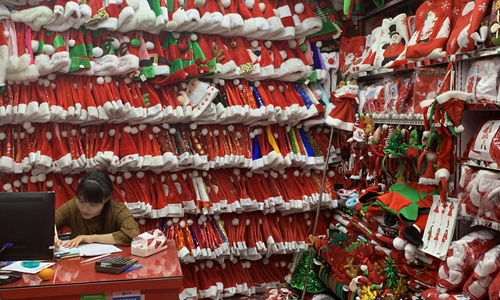HOME >> BUSINESS
US consumers still buy Chinese goods
By Wang Bozun in Beijing and Ma Jingjing in Yiwu Source:Global Times Published: 2019/11/13 22:38:22
Cost, efficiency means no country can compete: expert

A woman sits behind a desk in a shop full of Christmas hats for export in Yiwu, East China's Zhejiang Province. Photo: Ma Jingjing/GT
Chinese wholesale exporters are only slightly affected by the prolonged China-US trade war, with US consumers still buying Chinese products, which also attract swarms of purchasers from other countries.
On Wednesday, the Global Times visited Yiwu International Trade City in East China's Zhejiang Province, where many wholesalers were busy introducing products from Christmas crafts to handbands to hardware to clients from the across the world, including Moldova, India and Albania.
In the city, there is a toy store that exports mainly to the US and Europe. The owner of the store, surnamed Li, told the Global Times that the amount of US orders is the same as last year, but some large US clients tend to bargain for lower prices because of additional tariffs.
"Our US clients have increased their sales prices in the US. Now they can't hike prices so they ask us to lower prices," he said, noting that his US clients made good profits by importing from his factory.
"It's estimated that my US clients have earned over 20 million yuan ($2.8 million) so far this year by importing toys from our factory," Li said. He said he sells toys at a wholesale price of $3 to his US clients, whatever the size. His clients then sell the toys at large supermarkets in the US at prices of more than $20.
"US clients can't abandon us because they can't find suppliers in other countries who can manufacture goods as quickly as us in four or five days and offer the best quality," he said.
The China-US trade war over the past year has affected normal bilateral trade and economic relations.
In the first 10 months of this year, China's exports to the US stood at 2.39 trillion yuan, sliding 6.8 percent, data from the General Administration of Customs showed.
Shifting focus
Although exports to the US have declined amid the trade war, Chinese products still attract other countries' purchasers.
A Moldova businessman named Ion Ciurea came to Yiwu to purchase wholesale bathroom products on Wednesday.
"The earlier you come to Yiwu, the better. You have many choices in the Yiwu wholesale market. It offers the best value," he said, regretting that he didn't know about Yiwu until 2016.
Ciurea said in his own country of about 3 million people, a few more than in Yiwu, there are only several manufacturers producing items for daily use, which were imported from Ukraine.
"Later, I got to know our Ukraine suppliers imported from Yiwu at lower prices, so I came here to purchase in person," he said, adding that fierce competition makes lower costs a huge advantage.
He comes to Yiwu twice a year to buy more than $80,000 of goods that he sells at retail prices in Moldova.
As foreign purchasers increasingly import goods from China, they tend to use the yuan instead of the US dollar in transactions.
Li said his Russian clients now all use yuan, while only a small portion of clients from other countries use US dollars.
Remaining cautious
Some Middle East clients buy raw materials in Yiwu and use them to make products exported to the US or Europe. These clients have reduced their orders due to the volatile US dollar, but Li said he hopes "the trade war could end as soon as possible to create a better international trade environment."
Speculation rose again on Tuesday about a phase-one deal between China and the US could be reached soon as US President Donald Trump said in a speech that "a significant phase-one trade deal with China could happen. Could happen soon," Reuters reported on Tuesday.
However, Cao Heping, a professor at the School of Economics at Peking University in Beijing, said that it is too early to speculate on such a deal.
"That's Trump's election campaign strategy. China is the biggest exporting country to the US, and the Trump administration leverages this to add pressure on China," he said.
Tian Yun, vice director of the Beijing Economic Operation Association, told the Global Times on Wednesday that as long as the yuan exchange rate supports exports effectively, Chinese small commodities can maintain their leading position in the world.
Posted in: INDUSTRIES